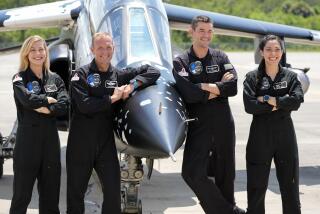Psychology Students Ponder Effects of Space Travel : Aerospace: Claremont McKenna College has joined nationwide project that promotes rocket-science education for undergraduates.
- Share via
Professor Harvey Wichman’s psychology class starts off easy--a little bit on orbital mechanics, a quick look at solid rocket boosters.
And then the Claremont McKenna College students plunge into the nitty-gritty, pondering “space blues” and “space motion sickness” as part of a passenger rocket project for McDonnell Douglas Aerospace in Huntington Beach.
Claremont and 20 other campuses nationwide are part of McDonnell Douglas’ University Alliance Program, a project that promotes space-science education for undergraduate liberal arts students. As part of the project, students are proposing design and licensing plans for the developing Delta Clipper, a reusable rocket that would propel 14 passengers into orbit for four days.
Not a bad assignment for a psychology class at Claremont, a small liberal arts college where students are more likely to study Sigmund Freud than Neil Armstrong. But Wichman, an experimental psychologist, hates drawing academic lines in the sand--science students in their labs over here, psychology students with their rats over there.
In his Claremont office, where a poster of the Wright brothers’ plane adorns the wall, Wichman pounded his feet in mock frustration when asked how a psychology class got involved in a space flight project.
“Bright people look at (the passenger rocket) and say, ‘Gee, how much pressure would be in there?’ They figure it out; it doesn’t take high school algebra to figure that out!” said Wichman, 62, his voice rising, his hands slicing the air for emphasis.
It’s easy to imagine the silver-haired professor as a wide-eyed 17-year-old in Milwaukee, where he piloted his first airplane, a 1939 50-horsepower J-3 Piper Cub.
After that, Wichman fell hopelessly in love with flight; later, he became a flight instructor and former NASA Summer Faculty Fellow at the Jet Propulsion Laboratory. Wichman also worked as a psychological consultant for aerospace companies, designing everything from cockpit control panels to space stations.
He says his students are quick studies in “Psychology 102: Practicum in Aerospace Human Factors,” which they take for psychology credit. Although the class involves some science, students learn mostly about the psychological aspects of space flight.
“This is a liberal arts college!” exclaimed Wichman, who speaks in staccato, emphatic sentences. “We’re supposed to be teaching students about everything! They should know something about science! They’re going to be leaders of our nation!”
Two years ago, McDonnell Douglas managers asked him to work as a consultant on the Delta Clipper project, studying the psychological aspects of passenger flight.
Instead, at Wichman’s suggestion, McDonnell Douglas agreed to involve his classes as part of the University Alliance Project. The Claremont students’ expenses--about $3,000 a year for materials, travel and off-campus meals--are paid by the James Irvine Foundation, a philanthropic organization in Orange County.
Students work directly with McDonnell Douglas engineers, visiting the Huntington Beach office about twice a month. In March, Wichman and two student team leaders met in Albuquerque with McDonnell Douglas and federal officials to discuss the possibility of developing a civilian space port in New Mexico on government land.
The McDonnell Douglas team is developing an experimental single-stage reusable rocket under a two-year, $58-million grant from the federal Ballistic Missile Defense Organization. As a separate company project, McDonnell Douglas’ goal is to develop the Delta Clipper by 2000.
The lightweight, inexpensive Clipper would take off vertically, orbit the earth and land in one stage without the unwieldy fuel tanks or booster rockets that characterize space shuttle flights.
In 1992, Wichman’s first semester class of nine students put together a model passenger compartment for the Clipper; they lacked real spare rocket parts, so they improvised with GI Joes in space suits and parts from a toy Corvette.
They also wrote a report on Clipper flight operations. Among the considerations: regular meal schedules to cope with “space blues,” a run-down, flu-like feeling experienced after eating in orbit.
The students also considered the dynamics of space flight among 14 people, particularly interaction among passengers of different ethnicities and cultures. They suggested that passengers write and exchange brief autobiographies before the flight.
William A. Gaubatz, director of the Delta Clipper Programs, called the students’ work very professional.
“Part of the concepts they came up with in terms of the public’s flying was beyond just the specifics of flight times involved or seating arrangements,” he said. “They also went into the potential makeup and diversity of passengers. . . . What they’re doing is really so new that they are actually breaking the ground for new concepts and ideas that are going to be put into practice.”
Wichman’s second semester class of 12 students prepared a report on proposed federal licensing issues for passenger flights into space. This year’s class of six students is continuing work on issues involved in licensing.
As part of the Clipper project, they also are designing a passenger compartment for suborbital flights, such as rocket trips from continent to continent in 40 minutes.
Each of the six students in the second semester of this year’s limited enrollment class is eager to see the Clipper soar--and they all hope to be on board someday, with stories for their children or grandchildren about how they had a hand in the rocket’s birth.
“It’d be real neat to see it someday come into existence because then you could go, ‘I was a part of that,’ ” said Will Dorsey, 20, a government and psychology major.
But the students are impatient.
“It’s hard not to feel like you’re part of a cutting edge, but it’s also really discouraging when you see cutbacks and things like that,” said Rene Gabri, a 21-year-old psychology and art major.
“I’m also hopeful that one day someone’s going to come around with a vision and put it together and figure out that space is just a natural progression because of our desire to journey to new places.”
More to Read
Sign up for Essential California
The most important California stories and recommendations in your inbox every morning.
You may occasionally receive promotional content from the Los Angeles Times.













